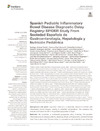Identificador persistente para citar o vincular este elemento:
https://accedacris.ulpgc.es/jspui/handle/10553/106863
| Título: | Spanish Pediatric Inflammatory Bowel Disease Diagnostic Delay Registry: SPIDER Study From Sociedad Española de Gastroenterología, Hepatología y Nutrición Pediátrica | Autores/as: | Jiménez Treviño, Santiago Pujol Muncunill, Gemma Martín-Masot, Rafael Rodríguez Martínez, Alejandro Segarra Cantón, Oscar Peña Quintana, Luis Armas Ramos, Honorio Eizaguirre Arocena, Francisco Javier Barrio Torres, Josefa García Burriel, José Ignacio Ortigosa Castillo, Luis Donat Aliaga, Ester Crujeiras Martínez, Vanesa Barros García, Patricia Botija Arcos, Gonzalo Bartolomé Porro, Juan Manuel Juste Ruiz, Mercedes Ochoa Sangrador, Carlos García Casales, Zuriñe Galicia Poblet, Gonzalo Oliver Goicolea, Pablo Lorenzo Garrido, Helena García Romero, Ruth La Orden Izquierdo, Enrique Pérez Solis, David Navas-López, Víctor Manuel Díaz Martin, Juan José Martín de Carpi, Javier |
Clasificación UNESCO: | 32 Ciencias médicas 320503 Gastroenterología 320110 Pediatría |
Palabras clave: | Crohn's disease Children Diagnostic delay Inflammatory bowel disease Time to diagnosis, et al. |
Fecha de publicación: | 2020 | Publicación seriada: | Frontiers in Pediatrics | Resumen: | Background and Aims: Diagnostic delay (DD) is especially relevant in children with inflammatory bowel disease, leading to potential complications. We examined the intervals and factors for DD in the pediatric population of Spain. Methods: We conducted a multicentric prospective study, including 149 pediatric inflammatory bowel disease patients, obtaining clinical, anthropometric, and biochemical data. Time to diagnosis (TD) was divided into several intervals to identify those where the DD was longer and find the variables that prolonged those intervals. Missed opportunities for diagnosis (MODs) were also identified. Results: Overall TD was 4.4 months (interquartile range [IQR] 2.6–10.4), being significantly higher in Crohn's disease (CD) than in ulcerative colitis (UC) (6.3 [IQR 3.3–12.3] vs. 3 [IQR 1.6–5.6] months, p = 0.0001). Time from the visit to the first physician until referral to a pediatric gastroenterologist was the main contributor to TD (2.4 months [IQR 1.03–7.17] in CD vs. 0.83 months [IQR 0.30–2.50] in UC, p = 0.0001). One hundred and ten patients (78.3%) visited more than one physician (29.9% to 4 or more), and 16.3% visited the same physician more than six times before being assessed by the pediatric gastroenterologist. The number of MODs was significantly higher in CD than that in UC patients: 4 MODs (IQR 2–7) vs. 2 MODs ([IQR 1–5], p = 0.003). Referral by pediatricians from hospital care allowed earlier IBD diagnosis (odds ratio 3.2 [95% confidence interval 1.1–8.9], p = 0.025). Conclusions: TD and DD were significantly higher in CD than those in UC. IBD patients (especially those with CD) undergo a large number of medical visits until the final diagnosis. | URI: | https://accedacris.ulpgc.es/handle/10553/106863 | ISSN: | 2296-2360 | DOI: | 10.3389/fped.2020.584278 | Fuente: | Frontiers in Pediatrics [ISSN 2296-2360], n. 8, 584278 (Octubre 2020) |
| Colección: | Artículos |
Citas de WEB OF SCIENCETM
Citations
10
actualizado el 01-feb-2026
Visitas
320
actualizado el 15-ene-2026
Descargas
105
actualizado el 15-ene-2026
Google ScholarTM
Verifica
Altmetric
Comparte
Exporta metadatos
Los elementos en ULPGC accedaCRIS están protegidos por derechos de autor con todos los derechos reservados, a menos que se indique lo contrario.
